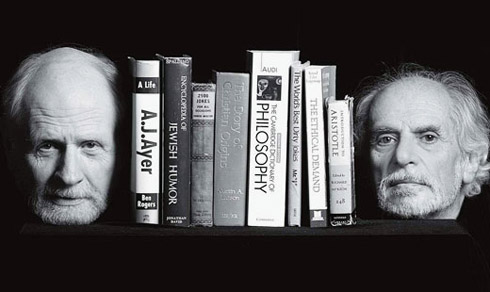From their freshman year in college they were inseparable pals, once called “the Mutt and Jeff of post-Kantian idealism.” That epithet somehow failed to catch on, even though both were philosophy concentrators and Tom Cathcart ’61 and Daniel Klein ’61 do stand six-foot-five and five-foot-eight, respectively. Both studied with Paul Tillich and Willard van Orman Quine, and took a junior tutorial with classmate and current U.S. Supreme Court Justice David Souter. Together they bucked the fashion of Harvard’s philosophy department, which considered existentialism softheaded, and got onto a jag of existential ethics for a time. “We were going around being obnoxious about what was an ‘authentic’ life versus an ‘inauthentic’ life,” says Klein.
 |
Courtesy of the publisher |
Socratic monologues? Coauthors Tom Cathcart (left) and Daniel Klein hold a skull session, flanking books that range from Ayer to Aristotle, with some Jewish humor and dirty jokes in between. |
Nearly half a century later, those epistemological theories, truth tables, and falsifiable propositions have borne fruit in Cathcart and Klein’s new book, Plato and a Platypus Walk into a Bar...: Understanding Philosophy through Jokes (Abrams). Consider it Philosophy 101 as taught by Jackie Mason. A philosophical fallacy like post hoc ergo propter hoc—assigning a causal role to something simply because it preceded something else—becomes more engaging when illustrated:
A New York boy is being led through the swamps of Louisiana by his cousin. “Is it true that an alligator won’t attack you if you carry a flashlight?” asks the city boy.
His cousin replies, “Depends on how fast you carry the flashlight.”
Philosophy and humor “do spring from a common enterprise: taking a common wisdom and flipping it on its head,” Klein argues. The brief, highly accessible book romps through metaphysics, logic, epistemology, and ethics, and includes chapters on philosophy of religion and language, all studded with references to films, songs, current events, and anecdotes. It informs us that even though Sherlock Holmes is celebrated for his “deductions,” he generally used not deductive but inductive logic—carefully observing the situation, then generalizing from his prior experience using analogy and probability. Take the time, for example, when:
Holmes and Watson are on a camping trip. In the middle of the night Holmes wakes up and gives Dr. Watson a nudge. “Watson,” he says, “look up at the sky and tell me what you see.”
“I see millions of stars, Holmes,” says Watson.
“And what do you conclude from that, Watson?”
Watson thinks for a moment. “Well,” he says, “astronomically, it tells me that there are millions of galaxies and potentially billions of planets. Astrologically, I observe that Saturn is in Leo. Horologically, I deduce that the time is approximately a quarter past three. Meteorologically, I expect that we will have a beautiful day tomorrow. Theologically, I see that God is all-powerful, and that we are small and insignificant. Uh, what does it tell you, Holmes?”
“Watson, you idiot! Someone has stolen our tent!”
The authors also explore relativity of time, as with this example:
There is a knock on the door, but when the woman answers it, there’s only a snail. She picks it up and throws it across the yard. Two weeks later there’s another knock on the door. The woman answers the door, and there’s the snail again. The snail says, “What was that all about?”
“We take on some pretty hard ideas,” says Klein. “Like comparing Kant’s categorical imperative to the Golden Rule—they’re similar, but not the same.” He can’t resist adding, “A sadist is a masochist who follows the Golden Rule.”
Klein is clearly the jokester, Cathcart the philosopher; the latter, as part of a “checkered” career that included stints as a divinity student, probation officer, hospital administrator, and hospice director, has even taught philosophy for three years at Westbrook Junior College in Portland, Maine, and recently published a piece on St. Anselm’s ontological argument in Theology Today. Klein wrote jokes for television quiz shows and comics like Flip Wilson, Godfrey Cambridge, and Lily Tomlin before switching to books, of which he has written dozens, including The Half-Jewish Book, novelty works like Where’s Elvis?, nine novels, and one previous collaboration with Cathcart, Macho Meditations (1997), which Cathcart calls “faux inspirations for beer drinkers.”
They began the Plato project by holing up for a weekend with a dictionary of philosophy and a few joke books at a motel in Gloucester, Massachusetts. “You can’t start with a philosophical concept and try to find a joke for it,” Cathcart explains. “The joke is primary.” But “Most jokes are puns,” says Klein, “and 99 percent of puns do not have philosophical content.” When Klein found a joke—many are Jewish jokes, one of his staples—with “a philosophical feel or smell,” Cathcart might dissect it to reveal, say, that its punch line depends on someone violating the law of non-contradiction. “It’s an entertaining way to learn philosophy,” says Klein. The authors, who live with their respective wives in the Berkshires (Klein) and on Cape Cod (Cathcart), worked mostly by e-mail and phone, then convened to polish the final draft.
The result is one of those rare volumes of which an author can remark, as Klein does, “Some of the best jokes are in logic and metaphysics.”
~C.L.





